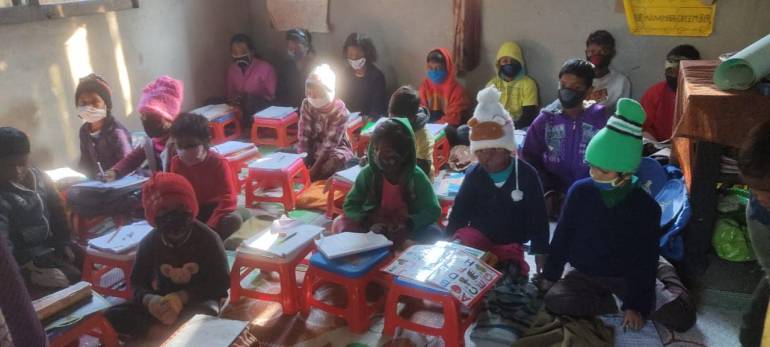Jesuits start alternative learning centers in India’s West Bengal State

A Jesuit-run center has started 30 alternative learning or study centers for tea garden students in the Jalpaiguri district of the Indian state of West Bengal.
“Tea garden children at study centers have a tremendous willpower to be educated where the government has ignored these poor tea workers’ children,” said Jesuit Father Pascal Xalxo, director of Human Life Development & Research Centre (HLDRC).
According to him, this initiative is undertaken in collaboration with SOS India, a children’s NGO, to help students continue their learning and education.
Most schools in India are severely affected due to the pandemic and closure of schools. This has adversely affected their learning abilities and education.
“There is no proper policy on education for poor children due to prolonged closure of schools from Covid-19. Besides, the pandemic at its best is damaging children’s interest in learning. This must be a talking point for all responsible citizens,” said Father Xalxo, an educator and human rights activist.
These study centers organized by HLDRC function as informal learning centers, where volunteer teachers tutor students in groups.
Some studies in education have revealed that students from tea gardens, especially those coming from remote areas fair quite poorly due to lack of study facilities and assistance at homes.
The Jesuit-run HLDRC has been rendering its premises for the evening classes/tuition for more than 500 students in remote tea gardens of North Bengal.
Following the success of this model before the pandemic, Father Xalxo with generous help from an agency has started study-aid-centers in Manja, Belgachi, and Saidabad tea gardens of Darjeeling Terai and Red Bank, Surendranagar, and Dharanipur tea estates of Dooars region. More than 200 poor students benefit from their studies and personality development.
From 2017, Jesuit Father Lalit P. Tirkey, a staff at HLDRC, also added more study centers as the request increased. So, with help from Hayden Hall, Darjeeling, and German Jesuits, study centers were opened in Dagapur, Nandovita-Amjamni, Kamala Bagan, and Gungaram tea gardens of Darjeeling Terai and Hantapara, Dhumsipara and Nangdala tea gardens of Alipurduar districts of the North Bengal tea region.
For some time, the government of West Bengal opened “Anganwadi” (a rural child care center in India), primary schools, high schools, higher secondary schools, colleges, and a few Hindi colleges in the Terai and Dooars tea garden region to educate Adivasi (tribals) students. But, these were again closed with the soaring of covid cases.
However, it is sad to see that these educational institutions are shut down for more than two years and very few efforts are made to arrange an alternative model of educating the students.
In the name of Covid-19, both the state and federal governments have failed to address to have a plan with concrete strategies in taking forward the education amid the pandemic.
Most educational institutions' heads and policymakers are silent that reflecting that they are happy with the existing bogus educational lockdown plan without having an alternative to educate the students.
About 67 % of rural children and about 49% of urban children are out of the school education system for the last 18 months due to not having access to internet facilities, mobile sets, and lack of motivation and knowledge to operate the system, according to a survey report of saving the children (June 2021).
Teachers at public schools are happy to receive their salary even no actual teaching activities are done.
“Who stops these institutions to form a small group of 30 students at their village and teachers moves from one place to another place maintaining Covid-19 protocol?” Father Xalxo asked.
“We are afraid to be with students but not afraid to go to crowded places,” he added.
Village communities have realized that the system has become defunct to reach out to the rural students to continue education.
To address the lacuna, people organized themselves to have learning centers in their villages through local volunteers—most of them are college students who are teaching the students.
“This is the new India we dream of. More people need to join in this social and educational outreach to poor children with HLDRC or other innovative initiatives undertaken by other NGOs or institutions,” Father Xalxo said.
Since 2013, HLDRC has empowered the marginalized and underprivileged, especially the tribal and other vulnerable groups, to build just world and self-reliant communities through capacity-building, legal aid, applied research, and different right-based approaches and social development mechanisms.
Radio Veritas Asia (RVA), a media platform of the Catholic Church, aims to share Christ. RVA started in 1969 as a continental Catholic radio station to serve Asian countries in their respective local language, thus earning the tag “the Voice of Asian Christianity.” Responding to the emerging context, RVA embraced media platforms to connect with the global Asian audience via its 21 language websites and various social media platforms.














